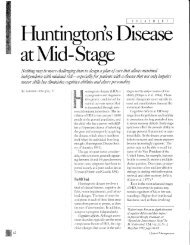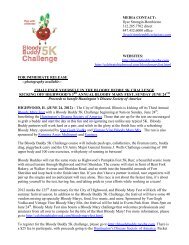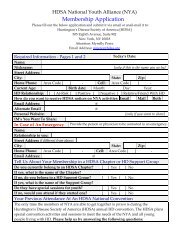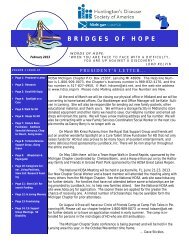Understanding Behavior in HD.final.8-18-05 - Huntington's Disease ...
Understanding Behavior in HD.final.8-18-05 - Huntington's Disease ...
Understanding Behavior in HD.final.8-18-05 - Huntington's Disease ...
You also want an ePaper? Increase the reach of your titles
YUMPU automatically turns print PDFs into web optimized ePapers that Google loves.
39<br />
time <strong>in</strong> bed to get adequate rest. A shift <strong>in</strong> the body’s daily rhythms occurs which makes adults prone to<br />
wak<strong>in</strong>g <strong>in</strong> the early morn<strong>in</strong>g and fatigued <strong>in</strong> the early even<strong>in</strong>g.<br />
Many persons with Hunt<strong>in</strong>gton’s <strong>Disease</strong> compla<strong>in</strong> of disturbed sleep. Although the reason for this is not<br />
fully understood, there are some causes of disturbed sleep that can respond to medical treatment. Thus, all<br />
problems of this sort should be promptly exam<strong>in</strong>ed by a doctor. Restlessness, wander<strong>in</strong>g and disturbances <strong>in</strong><br />
sleep are often just a part of the progress<strong>in</strong>g disease and may not respond to medical treatments. All family<br />
members need to practice good sleep hygiene because poor sleep can lead to memory impairment, <strong>in</strong>ability to<br />
concentrate, <strong>in</strong>terpersonal problems and <strong>in</strong>creased risk of serious illness and accidents.<br />
STRATEGIES TO ENCOURAGE A GOOD NIGHT’S REST<br />
• Ma<strong>in</strong>ta<strong>in</strong> a regular schedule, ris<strong>in</strong>g and retir<strong>in</strong>g at the same time every day.<br />
• Make the bedroom conducive to sleep by hav<strong>in</strong>g it cool, quiet and dark at night, but full of light <strong>in</strong> the<br />
morn<strong>in</strong>g.<br />
• Avoid excessive napp<strong>in</strong>g <strong>in</strong> the early even<strong>in</strong>g.<br />
• Eat a proper diet that is devoid of heavy, hard-to-digest food as well as alcohol, salty foods, and stimulants<br />
(coffee, chocolate, tobacco) before bedtime.<br />
• Exercise regularly, but not with<strong>in</strong> two to three hours of bedtime because it can cause overstimulation.<br />
• When us<strong>in</strong>g over-the-counter sleep medications, do it spar<strong>in</strong>gly. Never use them for more than four days<br />
unless directed by a physician. One becomes tolerant to the effects of sleep medications over time. That is,<br />
if they are used frequently they do not work as well. Too much use of some of these medications can lead<br />
to addiction.<br />
• Discuss your medication schedule with your physician. Certa<strong>in</strong> antidepressants and asthma drugs may be<br />
too stimulat<strong>in</strong>g for before-bedtime use. Try to m<strong>in</strong>imize the number of medications be<strong>in</strong>g used.<br />
• Take a warm shower or bath before go<strong>in</strong>g to bed. This will ease the transition to sleep.<br />
• To reduce night waken<strong>in</strong>g due to a full bladder, limit the amount you dr<strong>in</strong>k after d<strong>in</strong>ner. Make sure to use<br />
the toilet before bed.<br />
• Establish a safe environment <strong>in</strong> case of night-time wander<strong>in</strong>g. There are a number of ways to make it hard<br />
to get out of the house or yard without us<strong>in</strong>g restra<strong>in</strong>ts (e.g., bells on doors, hard-to-open doorknobs,<br />
deadbolt locks, oddly placed latches)

















